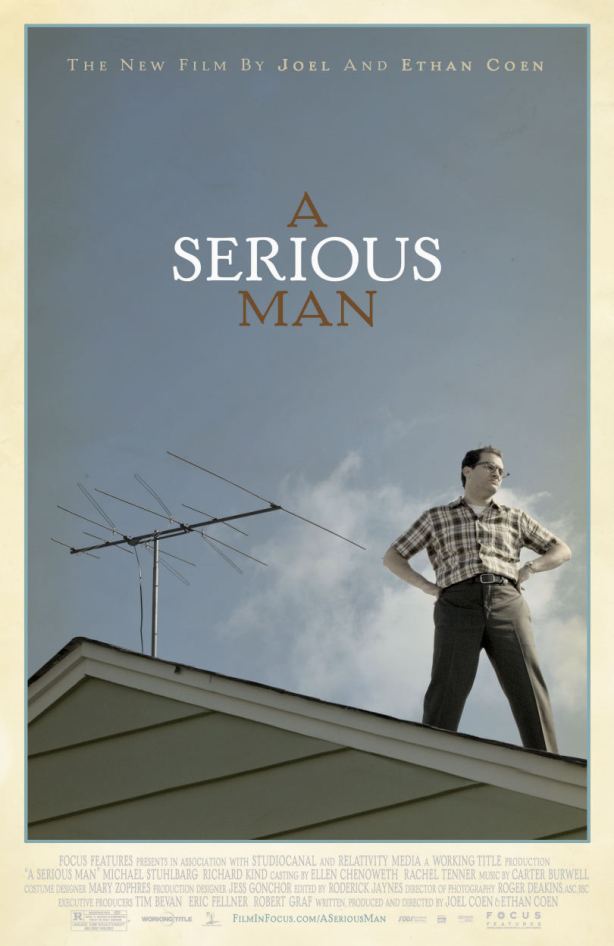A SERIOUS MAN plays tonight at Film Forum as part of their Coen Brothers retrospective. What follows are my collected writings on the movie. (It’s one I keep coming back to.)

The following intro is what I wrote the second time I watched A SERIOUS MAN. The main piece after that is my original review. A little bit maddening, isn’t it?
[December 29, 2011]
_____________________________________________
I watched A SERIOUS MAN again the other night. It’s weird to call a Coen Brothers movie underrated at this point, especially one that was nominated for Best Picture, but this one still feels that way to me. When I’m feeling argumentative (which seems to be a lot of the time), I’ll argue that its underrated status is directly because of how Jew-y it is. Really, it’s the Jew-y-est movie since MUNICH, and truthfully, it’s way Jew-y-er than that one was.
But really, it’s because of how weird the movie is. Even for the Coens. It’s out there. The rhythms are unconventional and the situations and performances are occasionally maddening. (All purposefully so, of course.) I still love A SERIOUS MAN tremendously, but I understand how it’s probably not for everyone. And I think it’s also saying some things about the universe that a lot of people just don’t want to hear — although I do believe that my initial writings on the movie, back in December (two months after I first saw the movie), got it a little bit wrong. When I scribbled out that piece, I didn’t account for an important plot point that affects the reading of the ending. (I also just plain made a mistake or two — Adam Arkin appears in three scenes, not just one. He’s still great, though!) I stand by my original reaction, because most of it still makes sense to me, but I wonder how I’d write it differently today.
_____________________________________________
I’ve been sitting on my thoughts about A SERIOUS MAN for over a month. Deliberation? Procrastination? Does it matter?
That last question is more meaningful than it may initially read.
Honestly, I feel pretty much the same when I think about A SERIOUS MAN now as I did when I first watched the credits roll. I think it’s pretty great. I think for what it’s trying to achieve, it’s just about perfect. Weirdly, the most comparatively under-recognized movie of the year is my current pick for the year’s single best. Even more weirdly, it’s the [roughly] annual entry from the Coen brothers, who at this point are a national institution and who were not too long ago crowned by the Oscar gods. With all that universal acclaim under their belts, you’d think that more people would be talking more about this movie. Doesn’t seem to be the case. Is that where I come in?
For those who haven’t seen it yet, here’s a spoiler-free recap: A SERIOUS MAN is set in the suburbs of Minneapolis, forty years in the past (presumably to distance it from Prince and his purple Revolution.) In this drab setting, a Jewish college professor with the hopes of tenure is undergoing a crisis of faith, a crisis of marriage, a crisis in all areas of his life, really – your proverbial existential crisis. He seeks out three separate rabbis for advice, and incidentally, none of those three are the one with whom he most wanted to speak. There’s also a lengthy prologue scene set in 19th-century Europe, in which an unlucky couple are visited by an old man who may or may not be a dybbuk, which is a demonic spirit from Jewish folklore. In retrospect, this scene doesn’t turn out to have much at all to do with the story of the Jewish professor. Or does it?
If all of the above sounds like the set-up for some kind of joke, that probably makes sense. This is a Coen Brothers picture. The Coen Brothers are the premiere trickster auteurs of American cinema. If you’re looking for them to explain what they’re up to, they are somewhat frustratingly cagey in the press and in interviews. They are masters at letting the films speak for themselves, and their films are masterly. Few filmmakers are so adept at the nuts and bolts of the cinematic process. Their casting sense is impeccable – here Michael Stuhlbarg, a stage actor barely known on film, does a terrific job as Larry Gopnik, the hapless professor, leading up a cast of little-knowns and complete unknowns. The biggest name in the cast is probably Adam Arkin, who is fantastic, charismatic and maddening in his…uh… only scene.
Of course, the movie looks great also – that’s thanks to the unbelievable talent of cinematographer Roger Deakins, who has worked with the Coens on most of their most visually striking movies, such as FARGO, THE BIG LEBOWSKI, O BROTHER, WHERE ART THOU?, and NO COUNTRY FOR OLD MEN. Between Deakins and the Coens, every frame of film is very specifically composed and timed, adding up to a deceptively thorough whole. The veteran editor Roderick Jaynes also doubtlessly had much to do with the deliberate pace of A SERIOUS MAN. Nothing about this movie is the least bit sloppy. Everything in it happens for a reason. More accurately, I should say, everything in it happens to make the movie’s point.
Which is what? The movie does end on a heavily symbolic note, which some people think is meant to be ambiguous, but I sure don’t. Some answers are to be found in the movie’s unofficial theme song, “Somebody To Love” by Jefferson Airplane. (You know, that trippy ‘60s song that Jim Carrey does karaoke to in THE CABLE GUY.) That song features into the movie’s action throughout its running time, and the moments when it plays are telling. Its best and funniest invocation happens late in the film – it’s both the movie’s best joke and probably the best indication of what the Coens are up to this time around. I’m pretty sure I get it, but I’m going to be frustratingly vague myself at offering up any answers here.
What does help to get to the bottom of it, and what I started to see as I gave A SERIOUS MAN all these days to sink in, is to look at where it falls into the Coens’ body of work. A SERIOUS MAN, here in 2009, follows NO COUNTRY FOR OLD MEN in 2007 and BURN AFTER READING in 2008. NO COUNTRY FOR OLD MEN is a blistering and crushingly bleak statement on the current state of mankind, and BURN AFTER READING is a gleefully nihilistic take on our current cultural temperature and on what we look to for popular entertainment. Did I say “nihilist”? Yeah, for a couple of guys who once very conspicuously made the concept of nihilism as an ethos into brilliant comedy, they sure do seem to be leaning more and more in that philosophical direction themselves.
Not that you’d necessarily notice from the outside. What you see most obviously on the surface of A SERIOUS MAN is Judaism, which is a culture that the movie captures very honestly and authentically. Between you and me, I have a strong suspicion that this is why A SERIOUS MAN hasn’t been remotely as talked-about as it deserves to be. It’s very Jew-y. And it’s legitimately Jew-y. It has the single greatest bar mitzvah scene ever put to film! It has very specific character names, and the most nimble use of Yiddishisms I’ve heard since the last time I was eavesdropping at Corky & Lenny’s. That’s not the kind of Jewishness that seems to appeal to American moviegoers, however. American moviegoers only want to see Jews when they’re in sex comedies, behaving like shnooks and nebbishes. They don’t want to see the word “serious” anywhere near their cinematic Jews – the one exception being that one guy who celebrates a birthday around this time of year. But that’s an entirely different and probably more heated conversation.
I could argue that the Jewishness is what has kept A SERIOUS MAN from the commercial success and cultural currency of the more popular Coen films, but the main point is that the blatant Jewishness actually obscures the movie’s true ethos, which I expect is exactly as the Coens intended it. The Jews, like the Catholics and the Muslims and the Scientologists and all the other religious folks of the world, have come up with all kinds of answers to explain the brutality of the universe, but it’s possible, if you are to take this movie at its word, that the answers may not even matter. Forget for a moment the chilling possibility that there may not be any answers, and consider this even more chilling notion: The answers may be there, but that doesn’t necessarily mean that they can help you.
If the tornado on the horizon is headed towards you, does it even matter if you can explain where it came from, or why it approaches? Does having that theoretical knowledge ensure in any way that you’ll survive the inevitable storm?
[December 9, 2009]
— JON ABRAMS.
- [THE BIG QUESTION] WHAT’S YOUR FAVORITE FEMALE ENSEMBLE IN MOVIES? - July 22, 2016
- [IN THEATERS NOW] THE BOY (2016) - January 24, 2016
- Cult Movie Mania Releases Lucio Fulci Limited Edition VHS Sets - January 5, 2016
Tags: Adam Arkin, Amy Landecker, Carter Burwell, ethan coen, Fred Melamed, Fyvush Finkel, George Wyner, joel coen, Michael Lerner, Michael Stuhlbarg, Richard Kind, Roderick Jaynes, Roger Deakins, Screenings, The Coen Brothers






No Comments